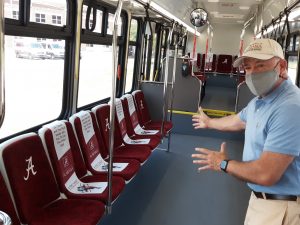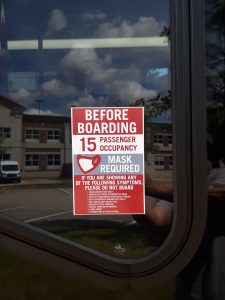
The University of Alabama’s Crimson Ride buses and 348-RIDE vans are in service this semester, with some changes due to the coronavirus.
James Knickrehm, associate director of transportation services, said the Capstone’s 46 handicapped-accessible buses will now operate from 7 a.m. to 9 p.m. Monday through Friday.
Students, faculty and staff are required to wear masks to board University transportation. There are now 15 designated seats on each bus, which normally accommodates 32 to 37 people.
Seating on 348-RIDE vans has been reduced from 10 to two riders.
The vehicles now have hand sanitizer dispensers, and screens have been installed to protect drivers.
In the mornings, evenings and during drivers’ breaks, the inside of each vehicle will be sprayed with disinfectant.
“It takes us about 45 seconds to fog a whole bus,” Knickrehm said. “It’s about 99% effective. It needs to sit for about 10 minutes before we put people back on the bus. We can do this all day.”
Another big change: bus routes and 348-RIDE limit transportation to on-campus-only residential sites, libraries and academic areas.

“The routes have been designed to move the students from the residential areas to the academic core around Gorgas Library,” Knickrehm said. “For example, the North Commuter Rocket that ran last year is now split in half and has two main pickups, one on Campus Drive West and one on Peter Bryce Boulevard.
“There are now three buses at pickup at Campus Drive and three at Peter Bryce. If we only ran one bus with capacity limited to 15 we’d have a lot of students stranded so now you’ll be seeing more buses more often.”
New routes can be viewed online and are displayed at each bus stop.
“If anyone believes there’s anything we need to change, call us, because we want to make sure we’re getting people where they need to be when they need to be there,” he said. “Our number is 205-348-7433. We’ll try to assistant as best we can.
“All this is subject to change because we don’t know what’s going to happen so everyone needs to be flexible and include a little more time in their transit plans since we’re limiting our ridership.”
Knickrehm said over Labor Day they’ll reassess how they operate to see what needs to be changed to better support the campus community.
